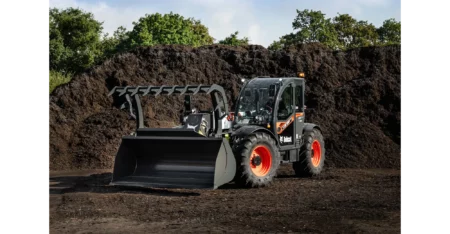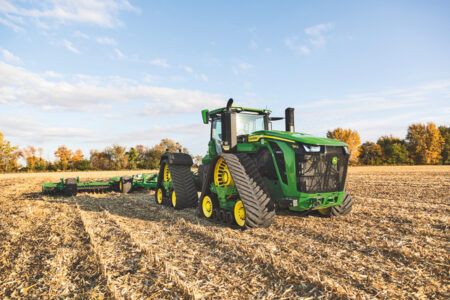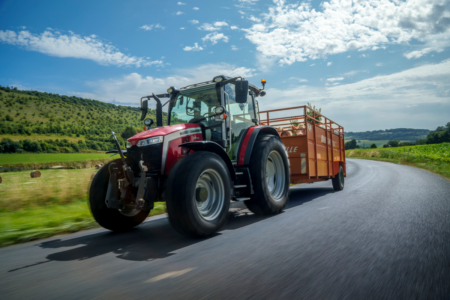JCB has launched its new Agri Pro Loadall range with what it says is the world’s first dual-technology transmission designed specifically for agricultural telescopic handlers one that combines the best characteristics of powershift and hydrostatic drives.
The DualTech VT variable transmission has been developed by JCB’s own engineering team and is at the heart of its new range of premium-specification, high-performance telescopic handlers: the JCB 531-70, 536-70 and 541-70 Agri Pro Loadalls.
The machines now have an advanced powertrain that brings together the proven power, torque and economy of the 4.8-liter JCB Ecomax engine and the exclusive new DualTech VT transmission.
JCB chief engineering and innovation officer Tim Burnhope said, “DualTech VT truly provides the best of both worlds, combining the low-speed controllability and easy driving characteristics of hydrostatics with the higher speed efficiency of direct drive powershift. The result is a machine range which is up to a massive 25% more productive than competitive models when handling.
Drawing on our expertise in both hydrostatic and powershift transmissions, DualTech VT is a massive achievement for our design and engineering team who have raised driveline technology to new heights. The new Agri Pro Loadalls offer unique features and driving characteristics making them perfect for farmyard, field and road.”
Key features of the new DualTech VT transmission include:
Fully hydrostatic drive providing fine stepless speed control up to 19km/h from standstill;
Automatic switching to electronically-modulated three-speed powershift above 19km/h for optimum power efficiency in higher speed field work, road travel and towing;
Power and Economy modes to optimize performance, efficiency and running costs;
Flexi mode to provide independent engine speed and ground speed control;
Selectable full-time 4WD or Auto 2WD over 19km/h for optimum driveline efficiency and reduced tire wear.
The new Loadall Agri Pro machines therefore have exceptionally precise low-speed maneuvering control and smooth, progressive response for loading and handling cycles, which the operator can adjust and fine tune to suit different applications and personal preferences.
At the same time, the direct drive powershift element of the transmission gives these new handlers the best climbing and high-speed towing ability. It all adds up to significant productivity gains across the board over existing competitive telescopic handlers.
The impact on productivity, especially for repeat loading cycles, is exceptional: up 13% over JCB’s current class-leading Agri Super handlers, and up to 25% over equivalent competitor machines.
Burnhope said, “Combining the superior high speed efficiency and towing ability of a JCB powershift transmission with the low-speed precision control advantages of a hydrostatic drive creates the ideal combination for operators who want maximum productivity and efficiency, and a premium driving experience. Agri Pro Loadalls deliver the best of both worlds in one machine.”
The innovative DualTech VT transmission is being launched in a new three-model range of 7-meter Loadall telescopic handlers with lift capacities of 3.1 tonnes, 3.6 tonnes and 4.1 tonnes. The 531-70, 536-70 and 541-70 AGRI Pro are premium-specification machines designed for customers wanting the ultimate telehandler in terms of productivity, performance, efficiency and ease of use.
The transmission exploits the power and economy potential of the JCB Ecomax T4 Final engine with hydrostatic and powershift drive systems using proven components uniquely combined for the first time in a single housing. The two modules work in harmony, seamlessly and automatically, to provide easy driving characteristics that can be fine-tuned to optimize driving comfort and performance for different applications.
The advanced hardware and control calibration for the DualTech VT transmission were developed in-house by JCB engineers and the transmission is now being produced on a new high-tech assembly line at JCB Transmissions in Wrexham, North Wales, where most of the powershift and synchromesh transmissions, transfer gearboxes and axles used in JCB machines are designed, engineered and manufactured.
The hydrostatic drive module of the DualTech VT transmission uses an electronically-controlled hydraulic pump and motor combination to provide fast response, fine speed adjustment and infinitely variable working speeds up to 19km/h.
Unlike hydrostatic transmissions in other telescopic handlers, which must handle power delivery from zero to top speed, the hydrostatic module in DualTech VT is optimized for low-speed response and controllability. As a result, it is quiet and smooth, as well as responsive and power-efficient.
In normal Drive mode, pressing the accelerator pedal influences both hydrostatic output and engine speed, with the control electronics balancing the two according to the driver’s demands. Precision inching is available through the brake pedal initial movement progressively disengages hydrostatic drive, giving the operator total control when pushing into a muck heap with no wear and tear on the brakes.
Engaging Flexi mode by pressing and holding the transmission down-shift button allows engine speed and ground speed to be controlled independently for the first time on a full-size Loadall.
An electronic hand throttle is used to select pre-set engine speeds peak torque at 1500rpm, peak power at 2200rpm or make adjustments in 100rpm increments. A dial adjusts maximum speed available from the hydrostatic drive between virtually zero and 19km/h.
The Flexi mode can be exploited for bulk handling and loading operations by setting the engine speed for optimum boom hydraulics performance, leaving the operator to regulate the handler’s ground speed using the accelerator pedal and focus on steering and boom operation.
Adjusting a speed-regulating dial enables the operator to limit hydrostatic drive top speed and so optimize driving characteristics for short loading cycles and confined locations an especially useful feature when loading a manure spreader from a cattle shed, for example.
Flexi mode also builds on the Vari-Speed feature of the fully hydrostatic JCB 525-60 compact handler to operate an attachment with hydraulic drive such as a yard sweeper, straw spreader or feeder bucket. In this situation, the engine speed is set to deliver the required amount of oil from the new 110-l/min high-flow auxiliary hydraulics circuit and a low ground speed is dialled in to dispense feed or bedding material at the required rate.
A ‘memory’ feature in Flexi mode means the operator can resume full speed to empty a sweeper bucket or collect another batch of feed and then return to the chosen settings with just a couple of button presses.
When a Loadall Agri Pro telehandler accelerates beyond 19km/h (11mph), whether in the field or on the road, the DualTech VT variable transmission automatically switches to its powershift system, where electronically modulated clutch packs make barely noticeable shifts between three mechanical gears up to the 40km/h (25mph) top speed.
With no torque converter needed, direct drive in each gear makes the most of available torque to deliver quick acceleration, strong climbing ability and the impetus to maintain speed on road inclines.
The transmission will skip-shift down to the lowest ratio, ready to pull away after slowing for a road junction and will short-shift when accelerating with a light load. Also, the transmission can be restricted to gears one, two or three as appropriate for field work gathering and loading bales, for example.
By optimizing the drivetrain to utilise the Ecomax engine’s torque characteristics for different work and travelling situations, the new DualTech VT transmission complements JCB’s expertise in engine and hydraulics performance and efficiency to create a highly productive handler.
Operators can fully capitalize on this by using the ‘power’ and ‘economy’ settings as appropriate the former allows the transmission to exploit full engine revs and power output in both hydrostatic and powershift drive, while the latter puts a 1700rpm ceiling on engine revs in working gears, changes the engine’s power delivery characteristics and initiates earlier up-shifts to use the least amount of fuel. The ‘economy’ mode typically reduces fuel consumption by more than 5% across an average agricultural telehandler duty cycle.
During more than 10,000 hours of customer evaluation using 10 pre-production Loadall Agri Pro handlers, JCB LiveLink telematics data records revealed average fuel consumption of just 6.4 l/hr significantly lower than the best competitor claims for fuel economy. Side-by-side comparisons have also revealed an 8.5% productivity advantage to the Agri Pro across an average agricultural duty cycle, as well as a 16% advantage when towing and, remarkably, a 25% higher productivity figure when handling.
“As farming businesses become bigger and they operate on land distributed over a wider area, so the ability to travel quickly and efficiently between sites has become increasingly important,” said Tim Burnhope.
“JCB Loadall telescopic handlers are already renowned among professional operators for their roading and towing ability; the Agri Pro models now offer the low-speed controllability of driver-adjustable hydrostatic drive.
“The DualTech VT transmission is a prime example of JCB’s innovation and engineering strengths coming together to create the best of both worlds: a new Agri Pro product range that will bring new levels of productivity, performance, control, refinement, fuel efficiency and positive operator experience to the Loadall the world’s number one telescopic handler.”
April 8, 2016
For a video of the Agri Pro in action, please click here.
For more images, please click here.




